
Many of us have been in a situation where we find ourselves burnt out from consistent social interactions, to the point where we aggressively seek out “alone time”. While temporary isolation can be a lifesaver, it turns out that prolonged isolation or loneliness can have some devastating effects on our health.
According to the National Institutes of Health, isolation is defined as a lack of human presence, whereas loneliness is defined as a lack of connection to others. It is not possible to be isolated in a room full of friends, but it is possible to feel lonely due to a lack of connection. Loneliness is a frequently overlooked public health issue that affects a stunning amount of Americans. More than 20% of Americans say they often or always feel lonely, left out, isolated from others, or lack companionship. To put that percentage in perspective, the amount of Americans that feel lonely is greater than the populations of Texas, Pennsylvania, and Florida combined.
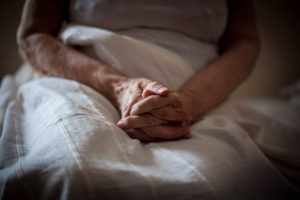 Loneliness and/or social isolation is typically associated with the elderly population, and for good reason, but a nationwide survey conducted in the U.K., led by Pamela Qualter of the University of Manchester, found that 40% of people aged 16-24 reported feeling lonely often or very often. In comparison, those aged 65-74 and those aged over 75 reported feelings of loneliness 29% and 27% of the time, respectively.
Loneliness and/or social isolation is typically associated with the elderly population, and for good reason, but a nationwide survey conducted in the U.K., led by Pamela Qualter of the University of Manchester, found that 40% of people aged 16-24 reported feeling lonely often or very often. In comparison, those aged 65-74 and those aged over 75 reported feelings of loneliness 29% and 27% of the time, respectively.
While these findings speak to the loneliness of U.K. residents, the 55,000 respondents makes this the largest survey into loneliness to date, and U.K. loneliness rates nearly mirror U.S. rates. This survey also came to the conclusion that those who feel lonely tend to have more online-only friends, as in friends exclusive to the internet. An online-only friendship can absolutely help with feelings of loneliness, but the trouble comes when we consider how these online-only friendships are formed.
The Penalties of Isolation
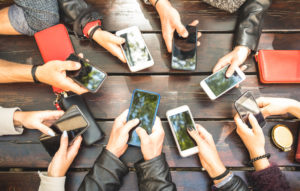 Young adults that spend more than 2 hours a day on social media have twice the chance of experiencing social anxiety when compared to those who spent less than 30 minutes a day on social media, according to a 2017 study published in the American Journal of Preventive Medicine. How cruel it is to discover that platforms built entirely around socializing tend to alienate and isolate their users. The same study also found that those who went online frequently (50+ times a week) are 300% more likely to feel isolated than those who went online the least (less than 9 times a week).
Young adults that spend more than 2 hours a day on social media have twice the chance of experiencing social anxiety when compared to those who spent less than 30 minutes a day on social media, according to a 2017 study published in the American Journal of Preventive Medicine. How cruel it is to discover that platforms built entirely around socializing tend to alienate and isolate their users. The same study also found that those who went online frequently (50+ times a week) are 300% more likely to feel isolated than those who went online the least (less than 9 times a week).
These findings send a stark reminder that not all interactions are healthy interactions, and that the motivation for being on social media may have a major impact on one’s experience. Seeing so many of one’s peers living “their best lives” and showing off their highlights contributes to the fear of missing out, and can lead to one questioning what they’re doing with their own life.
The way that loneliness and social isolation affects us is rather complicated. Those who feel isolated or lonely tend to be physically inactive and smoke more, which are two major risk factors for a number of illnesses. In fact, poor social relationships have been associated with a 29% increase in coronary heart disease and a 32% increase in stroke risk. This is consistent with well-documented associations between loneliness and suppressed immune function and/or higher blood pressure.
Loneliness physically alters the body, to the point that loneliness has been associated with increased inflammation, which is yet another risk factor for a multitude of cardiovascular diseases. These realizations show that loneliness is a public health issue that we, as a society, cannot afford to overlook any longer, because the social bonds and relationships we form are critical to our mind and bodies.
Quality & Quantity of Social Relationships
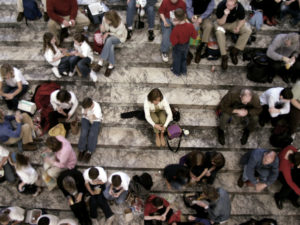 To address loneliness effectively, we must first understand the motivation for social support, and how social determinants affect our motivations and standards. The quality of social relationships is crucial, because one can have numerous friends and family members, but not feel connected to any of them. This is precisely the difference between being physically alone and being surrounded by people, but feeling disconnected.
To address loneliness effectively, we must first understand the motivation for social support, and how social determinants affect our motivations and standards. The quality of social relationships is crucial, because one can have numerous friends and family members, but not feel connected to any of them. This is precisely the difference between being physically alone and being surrounded by people, but feeling disconnected.
Kathleen Harris, co-author of a study on the link between social relationships and health, presented valuable information about the quality and quantity of relationships. Quality was measured by the level of social support and social strain they felt from those close to them, as well as whether they felt cared for or misunderstood. Quantity was measured by the existence of romantic relationships, how often they saw those close to them, and whether they were active in church or a community. The study showed that for adolescents, young adults, and seniors, the quantity of their relationships mattered. The level of social integration protected adolescents from obesity, adults of all ages from inflammation, and seniors from high blood pressure.
However, middle-aged adults (30-45) were a unique group, in the sense that quality matters more than quantity. Middle-aged adults with the highest levels of social support were less likely to be obese, while those with the most social strain were more likely to suffer from both obesity and inflammation. Harris stated that our social networks tend to be large during youth and adulthood, opening up the possibility of increased social support or increased social strain. This coincides with information published in another paper, showing that young people’s relationships help them develop social skills, while middle-aged adults tend to prefer quality due to the pacing of their lives, or the overabundance of relationships.
General & Targeted Interventions for Loneliness
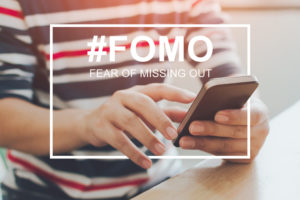 Loneliness is quite literally a quiet killer, but there are a number of methods that can help those who are suffering cope and do away with loneliness, starting with social media use. For anyone who frequents social media, it’s recommended that time on social media be reduced to 30 minutes a day for a few weeks. With less time to make comparisons between oneself and peers, it not only creates more time for building one’s own life, but minimizes the “fear of missing out”. For those who find it difficult to limit social media time, just being mindful of the time spent has shown significant decreases in anxiety.
Loneliness is quite literally a quiet killer, but there are a number of methods that can help those who are suffering cope and do away with loneliness, starting with social media use. For anyone who frequents social media, it’s recommended that time on social media be reduced to 30 minutes a day for a few weeks. With less time to make comparisons between oneself and peers, it not only creates more time for building one’s own life, but minimizes the “fear of missing out”. For those who find it difficult to limit social media time, just being mindful of the time spent has shown significant decreases in anxiety.
The particular social media platform also plays a part in helping oneself conquer loneliness. Platforms such as Instagram or Tumblr may be better for someone looking to connect with creatives and influencers, while Twitter may be a better platform for those looking to socialize and/or follow current events. Facebook may not be helpful for someone who has a tendency to compare themselves to those close to them.
![]() Cultivating one’s personal social media feed is a crucial component of social media use as well. Often, we gripe about the content of social media, oblivious to the reality that we can almost entirely shape and curate what social media we expose ourselves to on a daily basis. It has been proven that exposure to sexual content, cigarette advertising, and alcohol advertising has an evident effect on the beliefs and values of youth regarding these issues, and social media has the potential to shape beliefs and values on an endless amount of issues beyond the three mentioned. The conscious and subconscious effects media has on our psyche is a vital reason why it’s critical we control what media we consume and how often we consume it.
Cultivating one’s personal social media feed is a crucial component of social media use as well. Often, we gripe about the content of social media, oblivious to the reality that we can almost entirely shape and curate what social media we expose ourselves to on a daily basis. It has been proven that exposure to sexual content, cigarette advertising, and alcohol advertising has an evident effect on the beliefs and values of youth regarding these issues, and social media has the potential to shape beliefs and values on an endless amount of issues beyond the three mentioned. The conscious and subconscious effects media has on our psyche is a vital reason why it’s critical we control what media we consume and how often we consume it.
 Finding the right community, whether it is digital or physical, is a key component in fending off loneliness. Seeking out people with similar hobbies and passions is important, and embracing the innate human desire to learn will lead to bonds and connections created based on what can be learned from like-minded people.
Finding the right community, whether it is digital or physical, is a key component in fending off loneliness. Seeking out people with similar hobbies and passions is important, and embracing the innate human desire to learn will lead to bonds and connections created based on what can be learned from like-minded people.
Studies have shown that loneliness is often a “regulatory loop”, in which those who are lonely tend to remember more negativity, have increased sensitivity, and exhibit negative behavior, leading to diminished mental and physical health, which in-turn lowers self-esteem and leads to harmful coping skills. Addressing these harmful coping skills through behavioral therapy, mindfulness, or meditation can help break the cycle.
Confronting the underlying causes of each individual’s loneliness has been shown to have the greatest effect on loneliness, even more so than opportunities for socializing or the building of social skills.

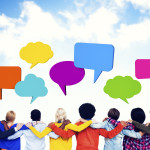




Join the Conversation